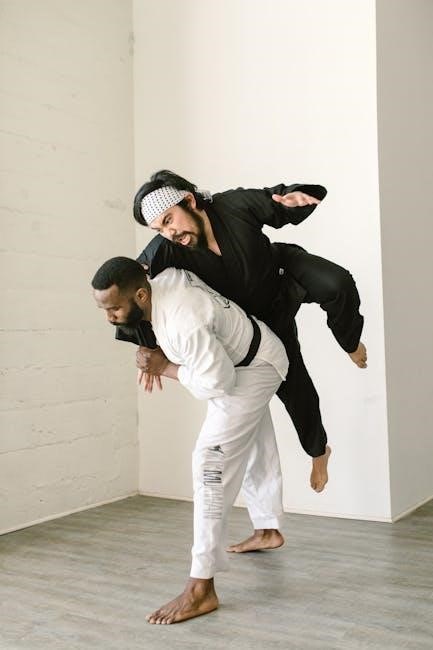Verbal Judo is a communication strategy emphasizing de-escalation and respect to manage conflicts. Developed by George J. Thompson, it teaches professionals and individuals to redirect tense situations effectively, ensuring safety and professionalism while fostering positive interactions.
Definition and Purpose of Verbal Judo
Verbal Judo, developed by George J. Thompson, is a communication strategy that combines psychological insights with martial arts principles. It focuses on de-escalating conflicts by redirecting others’ energy and emotions, rather than confronting them head-on. The purpose is to establish control over verbal encounters while maintaining respect and professionalism. Unlike aggressive communication styles, Verbal Judo emphasizes empathy, active listening, and strategic responses to diffuse tension. It equips individuals with tools to navigate challenging conversations, ensuring safety and constructive outcomes. This approach is particularly valuable in law enforcement, customer service, and personal relationships, where effective communication is critical. By mastering Verbal Judo, individuals can transform potentially explosive situations into opportunities for understanding and cooperation.
Overview of the Verbal Judo PDF
The Verbal Judo PDF, authored by George J. Thompson, is a comprehensive guide to mastering the art of persuasive communication. Spanning 186 pages, the book outlines strategies for de-escalating conflicts, resolving disputes, and enhancing interpersonal relationships. It introduces readers to techniques such as redirection, active listening, and emotional control, which are essential for managing difficult conversations. The PDF emphasizes the importance of respect and professionalism in communication, making it a valuable resource for law enforcement, educators, and professionals in high-stakes environments. By blending psychological insights with practical advice, Verbal Judo equips readers with tools to navigate verbal encounters effectively, ensuring safer and more constructive outcomes. This resource is widely praised for its accessible and actionable content.
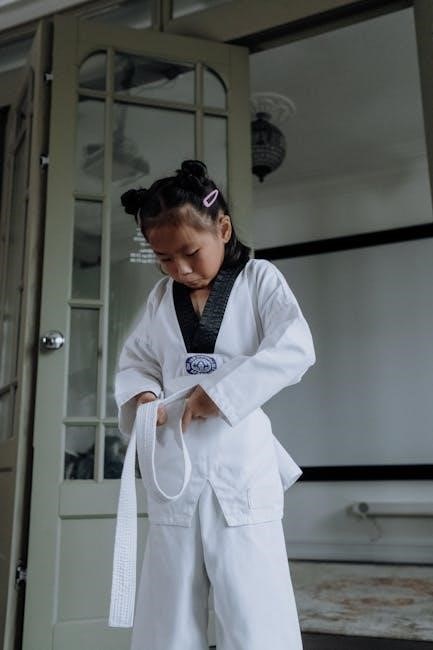
Origins and Development
Verbal Judo was developed by Dr. George J. Thompson, a renowned expert in communication, and refined over decades for law enforcement and professional settings to enhance safety and effectiveness.
George J. Thompson and Jerry B. Jenkins
Dr. George J. Thompson, a renowned communication expert, and Jerry B. Jenkins collaborated to develop Verbal Judo, a strategic approach to conflict resolution. Thompson, with his extensive background in martial arts and behavioral science, laid the foundation for this philosophy. Jenkins, a skilled writer, helped articulate these ideas into accessible frameworks. Together, they emphasized the importance of redirecting conversations, using respect, and de-escalating tensions. Their work, detailed in Thompson’s book Verbal Judo: The Gentle Art of Persuasion, provides practical strategies for professionals and individuals alike. The collaboration resulted in a powerful tool for enhancing communication skills, particularly in high-stakes environments like law enforcement. Their combined expertise transformed Verbal Judo into a globally recognized method for managing conflicts effectively and professionally.
Evolution of Verbal Judo Techniques
Verbal Judo techniques have evolved significantly since their inception, adapting to modern communication challenges. Initially developed for law enforcement, the strategies now apply to various fields, including business and personal interactions. The core principles—redirection, de-escalation, and respect—remain central but have been refined to address diverse cultural and situational contexts. Advances in training methodologies, such as online modules and interactive workshops, have expanded accessibility. The integration of emotional intelligence and active listening has further enhanced the approach, making it a versatile tool for conflict resolution. These updates ensure Verbal Judo remains relevant, offering practical solutions for effective communication in an ever-changing world. The evolution underscores its adaptability and enduring value across different professions and everyday life.

Key Principles of Verbal Judo
Verbal Judo emphasizes respect, active listening, and empathy to de-escalate conflicts. It teaches strategic communication to redirect hostile interactions into positive outcomes, ensuring safety and professionalism in all situations.
Redirection and De-escalation Strategies
Verbal Judo’s core lies in redirection and de-escalation, teaching professionals to navigate hostile situations calmly. By using active listening and empathy, individuals can redirect confrontations toward peaceful resolutions. Techniques include acknowledging emotions, maintaining respect, and employing strategic language to defuse tension. These strategies emphasize preventing escalation rather than reacting to it, ensuring safety and professionalism. The approach is particularly valued in law enforcement, where de-escalation can prevent conflicts from turning violent. Verbal Judo also encourages the use of non-verbal cues, such as tone and body language, to reinforce positive communication. By mastering these tactics, practitioners can transform potentially explosive interactions into constructive dialogues, fostering mutual understanding and respect. This method not only enhances professional interactions but also reduces complaints and improves overall relationships.
The Role of Respect in Communication
Respect is a cornerstone of Verbal Judo, emphasizing the importance of treating individuals with dignity, regardless of their behavior. This approach ensures that communication remains constructive, even in volatile situations. By acknowledging the other person’s humanity, Verbal Judo fosters an environment where both parties feel valued, reducing defensiveness and promoting cooperation. Respect is not about agreeing with the other person but about honoring their right to express themselves. This principle is particularly crucial in professional settings, such as law enforcement, where maintaining respect can de-escalate tensions and prevent conflicts. Verbal Judo teaches that respect is a powerful tool for building trust and resolving disputes amicably. It encourages active listening and empathy, ensuring that interactions remain positive and productive, even in challenging circumstances.
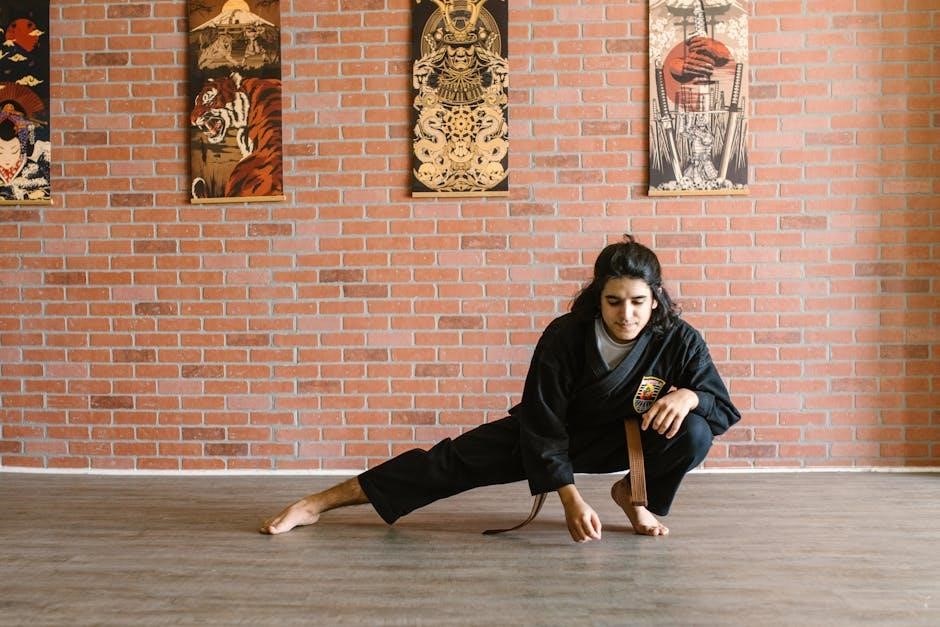
Applications of Verbal Judo
Verbal Judo is widely applied in law enforcement, public safety, and everyday communication to de-escalate conflicts and improve professionalism. It reduces complaints and enhances conflict resolution skills.
Law Enforcement and Public Safety
Verbal Judo is a critical tool for law enforcement and public safety professionals, enabling them to de-escalate potentially volatile situations safely. By employing tactical communication strategies, officers can redirect negative behaviors and gain compliance without resorting to physical force. This approach emphasizes respect and empathy, which are essential for building trust and maintaining community relations. The training reduces complaints and lawsuits, fostering a safer environment for both officers and the public. Its effectiveness has been proven in real-world scenarios, making it a cornerstone of modern policing and conflict resolution strategies.
Everyday Communication and Conflict Resolution
Verbal Judo extends beyond professional settings, offering practical strategies for everyday communication and conflict resolution. It equips individuals with techniques to navigate disagreements, whether at home, work, or in social interactions. By focusing on active listening and empathy, Verbal Judo helps transform confrontations into opportunities for understanding. Its principles, such as redirecting negative energy and maintaining respect, promote healthier relationships and reduce misunderstandings. The approach is not about winning arguments but fostering mutual respect and cooperation, making it invaluable for personal and professional growth. These skills empower individuals to communicate more effectively, leading to more harmonious interactions in all aspects of life.
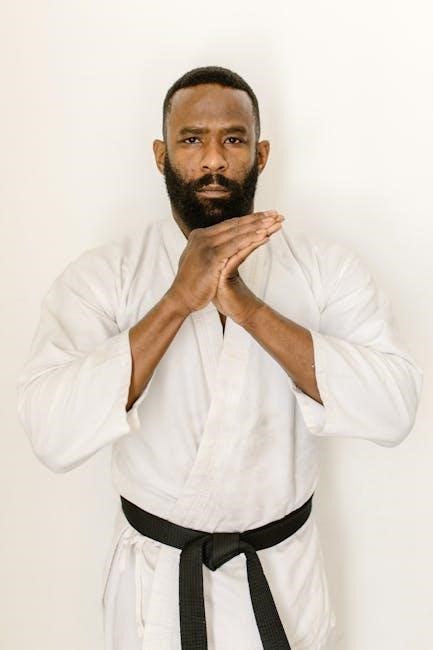
Benefits of Verbal Judo Training
Verbal Judo training enhances communication skills, reducing conflicts and complaints. It fosters professionalism, safety, and respect, benefiting both personal and workplace interactions effectively.
Reduced Complaints and Lawsuits
Verbal Judo training significantly reduces complaints and lawsuits by improving communication and de-escalation techniques. Officers and professionals learn to navigate tense situations with empathy and respect, minimizing misunderstandings. This approach ensures compliance without force, fostering trust and cooperation. By addressing conflicts constructively, Verbal Judo decreases the likelihood of legal disputes, protecting both individuals and organizations. Its emphasis on active listening and strategic responses helps prevent escalation, leading to fewer formal complaints. Organizations trained in Verbal Judo often report a substantial decrease in litigation, creating a safer and more professional environment for all parties involved.
Improved Professional and Personal Relationships
Verbal Judo enhances professional and personal relationships by fostering effective communication and mutual respect. It equips individuals with skills to navigate conflicts calmly, promoting understanding and collaboration. In professional settings, this leads to stronger teamwork and reduced friction. Personally, it improves interactions with family, friends, and colleagues by encouraging empathy and active listening. By addressing misunderstandings constructively, Verbal Judo strengthens bonds and builds trust. Its principles of respect and de-escalation create a positive environment for open dialogue, ensuring relationships thrive in both personal and professional spheres. This approach not only resolves conflicts but also prevents them, fostering deeper connections and more harmonious interactions overall.
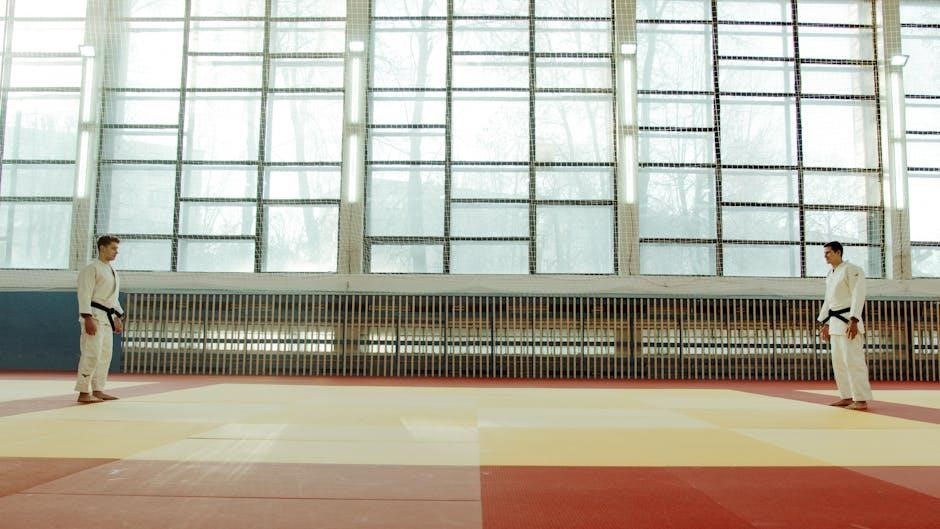
Advanced Techniques in Verbal Judo
Advanced Verbal Judo techniques include emotional control, strategic responses, and active listening. These methods help professionals and individuals de-escalate conflicts and communicate effectively, fostering mutual respect and understanding.
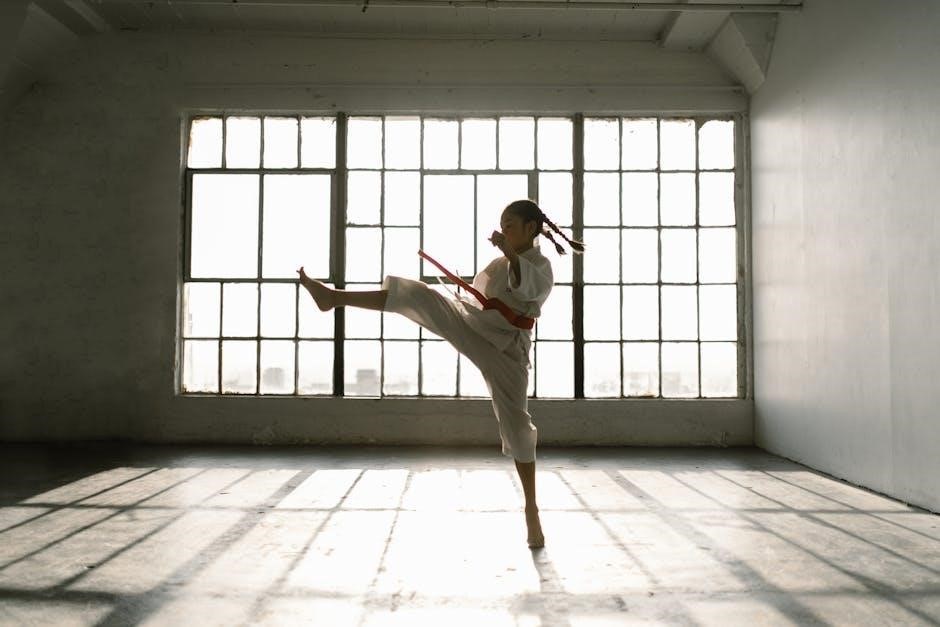
Active Listening and Empathy
Active listening and empathy are cornerstone techniques in Verbal Judo, enabling individuals to understand and acknowledge others’ perspectives. By fully engaging with what is being said, one can diffuse tension and build trust. Empathy allows for genuine connections, helping to de-escalate conflicts and foster cooperation. These skills are particularly emphasized in the Verbal Judo PDF, which provides practical strategies for implementing them in real-world scenarios. Through active listening, professionals can better navigate challenging interactions, ensuring effective communication and conflict resolution. Empathy not only enhances understanding but also promotes respect, making it a powerful tool in both personal and professional settings.
Emotional Control and Strategic Responses
Emotional control is a critical component of Verbal Judo, enabling individuals to remain calm under pressure and respond thoughtfully rather than react impulsively. The Verbal Judo PDF emphasizes techniques for managing one’s emotions, ensuring that communication remains focused and constructive. Strategic responses are tailored to specific situations, employing verbal tactics that redirect conversations toward positive outcomes. By maintaining emotional balance, professionals can avoid escalation and instead foster cooperation. These strategies are particularly valuable in high-stakes environments, where effective communication is essential for de-escalation and conflict resolution. Emotional control and strategic responses are key to transforming potentially volatile interactions into opportunities for understanding and resolution.
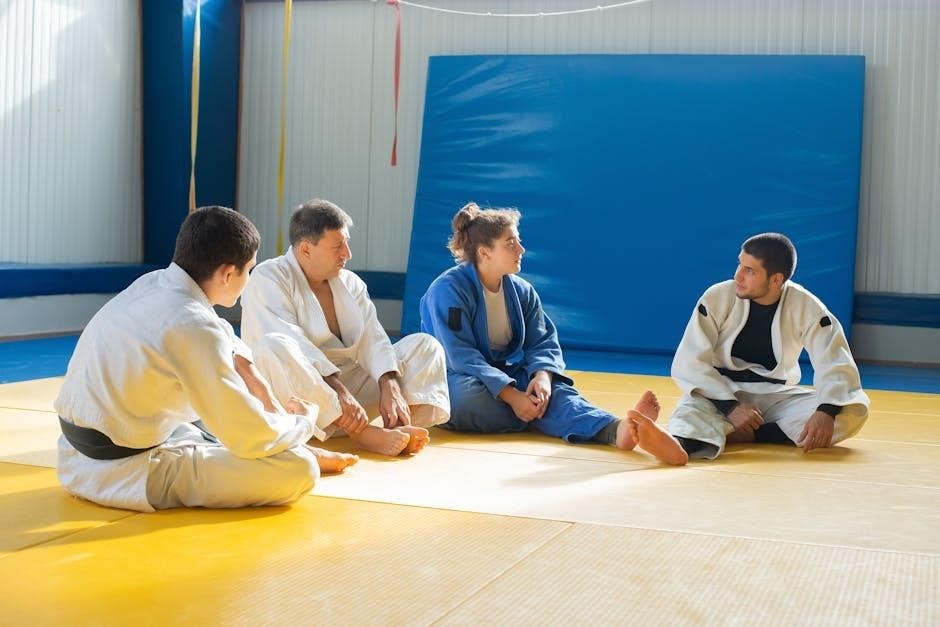
Real-World Examples and Case Studies
Law enforcement officers and professionals have successfully applied Verbal Judo to de-escalate high-tension situations, reducing conflicts and improving outcomes. Case studies highlight how strategic communication resolved disputes without force, demonstrating the effectiveness of these techniques in real-world scenarios.
Success Stories in Law Enforcement
Law enforcement agencies worldwide have reported significant success with Verbal Judo training. Officers trained in these techniques have consistently demonstrated improved conflict resolution skills, leading to safer interactions and reduced use of force. For instance, departments adopting Verbal Judo observed a notable decrease in public complaints and lawsuits, fostering trust and cooperation within communities. Specific case studies highlight officers effectively de-escalating high-tension situations, such as defusing potential arrests or calming aggressive individuals, without resorting to physical force. These success stories underscore how Verbal Judo empowers officers to prioritize professionalism, empathy, and strategic communication, resulting in improved public safety and stronger community relationships.
Applications in Business and Personal Life
Verbal Judo extends beyond law enforcement, offering valuable tools for business professionals and individuals; In corporate settings, it enhances negotiation, customer service, and team communication, fostering a respectful and productive environment. Managers trained in Verbal Judo report improved employee relations and conflict resolution, leading to increased workplace satisfaction. Personally, individuals use these techniques to navigate family disputes, improve relationships, and communicate more effectively. The principles of redirection and respect help individuals avoid verbal confrontations, creating harmonious interactions. By applying Verbal Judo, people in all walks of life can build stronger connections, resolve conflicts amicably, and achieve their goals through persuasive and empathetic communication.

Future Trends in Verbal Judo
Verbal Judo is expanding digitally, with online courses and resources making it accessible globally. Cultural adaptations are also emerging, tailoring its techniques to diverse international contexts effectively.
Digital Training and Online Resources
Verbal Judo is increasingly accessible through digital platforms, offering online courses, webinars, and downloadable PDF resources. These tools provide flexible learning opportunities for professionals and individuals worldwide. The Verbal Judo PDF is a popular resource, summarizing key strategies for de-escalation and effective communication. Online training modules, such as the Verbal Judo Police Course, focus on officer safety, professionalism, and conflict resolution. Digital platforms also enable global access to expert-led sessions, ensuring widespread adoption of Verbal Judo techniques. This shift toward online learning aligns with modern educational trends, making Verbal Judo more accessible than ever before.
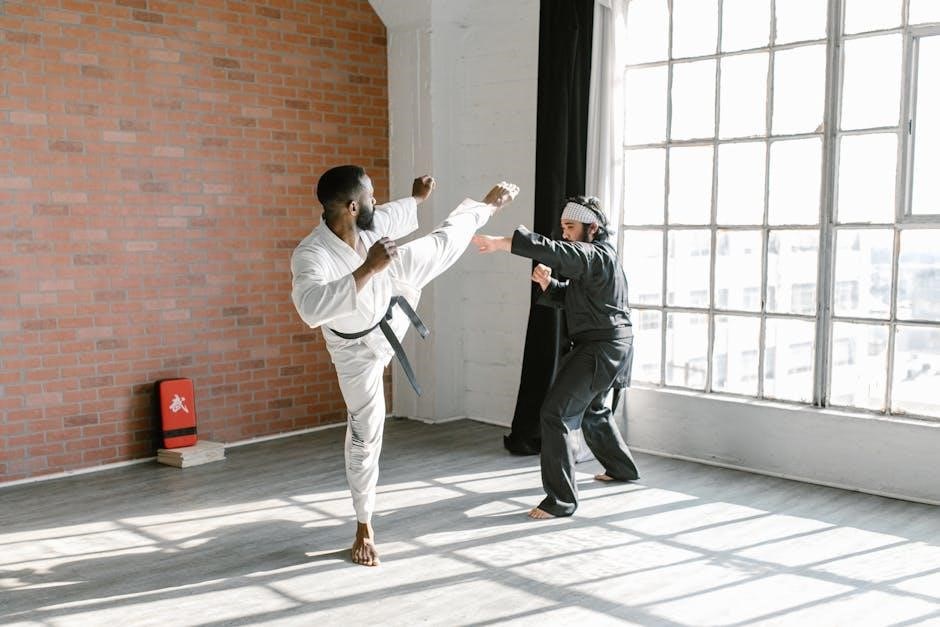
Cultural Adaptations and Global Applications
Verbal Judo has been successfully adapted across cultures, making it a versatile tool for global communication. Its principles of respect and empathy resonate universally, allowing professionals to navigate cross-cultural interactions effectively. In regions like the Middle East, Europe, and Asia, Verbal Judo techniques have been tailored to local communication styles while maintaining their core effectiveness. For instance, studies on English and Uzbek verbal expressions highlight how these strategies can bridge cultural gaps. The approach emphasizes understanding cultural nuances to enhance conflict resolution. This adaptability ensures Verbal Judo remains relevant in diverse settings, from law enforcement to business, fostering cooperation and reducing misunderstandings worldwide. Its global application underscores its value in promoting harmonious interactions across borders.
Verbal Judo offers timeless strategies for effective communication, empowering individuals to navigate conflicts with empathy and professionalism. Its global relevance and proven success make it indispensable in modern interactions.
Importance of Verbal Judo in Modern Communication
Verbal Judo is crucial in modern communication, offering practical strategies to de-escalate conflicts and foster understanding. Its emphasis on respect and empathy enables professionals and individuals to navigate challenging interactions effectively. By prioritizing dialogue over confrontation, Verbal Judo promotes safer and more constructive exchanges, reducing misunderstandings and fostering trust. In a diverse and increasingly complex world, these skills are essential for building strong relationships and resolving disputes without escalation. The techniques taught in Verbal Judo not only enhance professionalism but also empower individuals to communicate more effectively in both personal and professional settings, making it a vital tool for modern society.
Encouragement to Learn and Practice Verbal Judo
Learning and practicing Verbal Judo is highly recommended for anyone seeking to improve their communication skills. This method, developed by George J. Thompson, equips individuals with strategies to de-escalate conflicts and build positive interactions. By mastering Verbal Judo techniques, professionals can enhance their professionalism, reduce complaints, and foster safer environments. For personal relationships, it encourages empathy and understanding, leading to more harmonious connections. The availability of resources like the Verbal Judo PDF makes it accessible to everyone. Embracing this approach not only benefits individuals but also contributes to a more respectful and peaceful society; Investing time in Verbal Judo training can lead to significant improvements in both professional and personal interactions, making it a worthwhile pursuit for anyone committed to effective communication.
